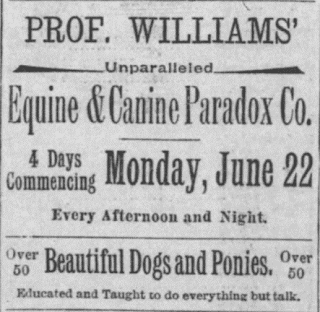By Kelli Huggins, Education Coordinator
Whenever you call
something a “dog and pony show” today, you’re probably not referencing a
literal dog and pony show. But travel back in time a mere 1o0 years or so and
you would be surrounded by actual shows with dog and pony performers. In fact,
in the late 19th and early 20th century, people wouldn’t
understand any other meaning of this term.
 |
| 1897 ad for a Norris Brothers Dog and Pony show in Elmira. |
Dog and pony shows were
small travelling shows in the late 19th and early 20th
centuries comprised of trained domestic animal actors. They were different from
other circuses of the era. Those often featured large wild animals, like
elephants or lions. Starting a dog and pony show was easier than those larger
circuses because the talent was cheaper and easier to acquire, even though a
considerable amount of training and skill was still necessary to create a
successful offering.
Some locals got in on
the dog and pony show game. Elmiran George Carrier reportedly had a troupe of
trained dogs that were “marvelously intelligent” and did shows in 1891. There
are unfortunately, however, no further references to these dogs. Elmira’s Globe
Theater manager Eugene Johnson served as the general agent of “Darling’s Little
Darlings.”
 |
| 1901 Darling's Little Darling's ad. |
The Gentry show
frequently came to this area. An 1893 show included 16 ponies and some of their
babies that drilled, danced, and answered questions. There was also “an army of
dogs, poodles, greyhounds, pugs and all kinds of fine dogs. One of the most
wonderful feats is the complete back somersault of Barney, a little fellow
whose breed is doubtful. Three of the dogs ride ponies at full speed. The
greyhounds do some wonderful high and distance leaping. The performance closes
with a pyramid of dogs and horses.”
 |
| 1893 Gentry show in Elmira. |
The Gentry brothers
weren’t the only game in town. Other shows came through the area with great
frequency. One Professor Williams and his
dog and pony show gave a performance to an audience of children from the
Orphans’ Home children in 1896.
 |
| 1896 advertisement |
 |
| Children at the Orphan's home enjoyed a Professor Williams show |
The dog and pony shows
ultimately fell out of fashion by the early 20th century. Americans
turned their attentions to other forms of entertainment, including vaudeville,
larger circuses, and the newly emerging film industry. Now we’re just left with
a phrase for which most people don’t even realize the real canine and equine
origins.
No comments:
Post a Comment